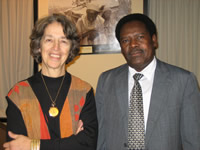 |
 |
|
PSU hosts conference on Darfur
Student groups sponsor event aimed at raising awareness of violence and genocide in Africa By Christie Toth, Daily Vanguard
March 14, 2006
Portland State will host an all-day conference March 15 with the goal of providing context regarding the current violence, displacement and famine in the Darfur region of Sudan. The conference opens at 8 a.m. in the Smith Memorial Student Union, Room 228. All of the workshops are free for students and require no prior registration. Although the 20-year civil war between northern and southern factions in Sudan was halted by a cease-fire more than a year ago, the situation in the Darfur region continues to worsen as the government-supported, predominantly Arab Janjaweed militias attack black African communities because of their supposed alliance with rebel groups. Widespread rape of women and children, as well as crop destruction and the disruption of planting, have destabilized communities and created a creditable threat of famine. U.N. peacekeeping troops will replace African Union forces in Darfur in 2007. After opening remarks and a panel discussion of the history of conflict and genocide in Southeast Asia, there will be three two-hour workshop sessions at the conference, with three to four workshop options each session. In addition to the current situation in Darfur, the workshop topics include genocidal histories in Rwanda, Uganda and Guatemala, the effects of genocide on women and public health, and discussions of the historical treatment of genocide and the definitions of genocide under international law. Two of the workshops will be led by Ruth Messinger, president and executive director of American Jewish World Service. Messinger, who topped the 2005 list of the “50 most influential Jews,” in the Jewish newspaper Forward, will speak on global responsibility in the 21st century, and discuss her own experiences visiting Darfur in 2004 and 2005. “Ruth is our most famous speaker,” said Lew Church, an organizer of the event. “One of the things she will be talking about is the indicators for where genocide will occur.” Along with the more conventional workshop offerings, attendees will have the option of making peace tiles with local artists, and viewing “Ararat,” Atom Egoyan’s controversial film about the first documented genocide, Ottoman Turkey’s 1915 attempt to wipe out its Armenian population.
“This is education,” Church said. “It’s learning for its own sake, to make people better people.” Event organizers hope the conference will be a starting point for students and members of the community to push for change on the international handling of the suffering in Darfur. “We’re hoping it will lead to action steps beyond just letter writing,” Church said. “We’re planning to do more direct action, such as protests, legal actions and sit-ins.”
|
